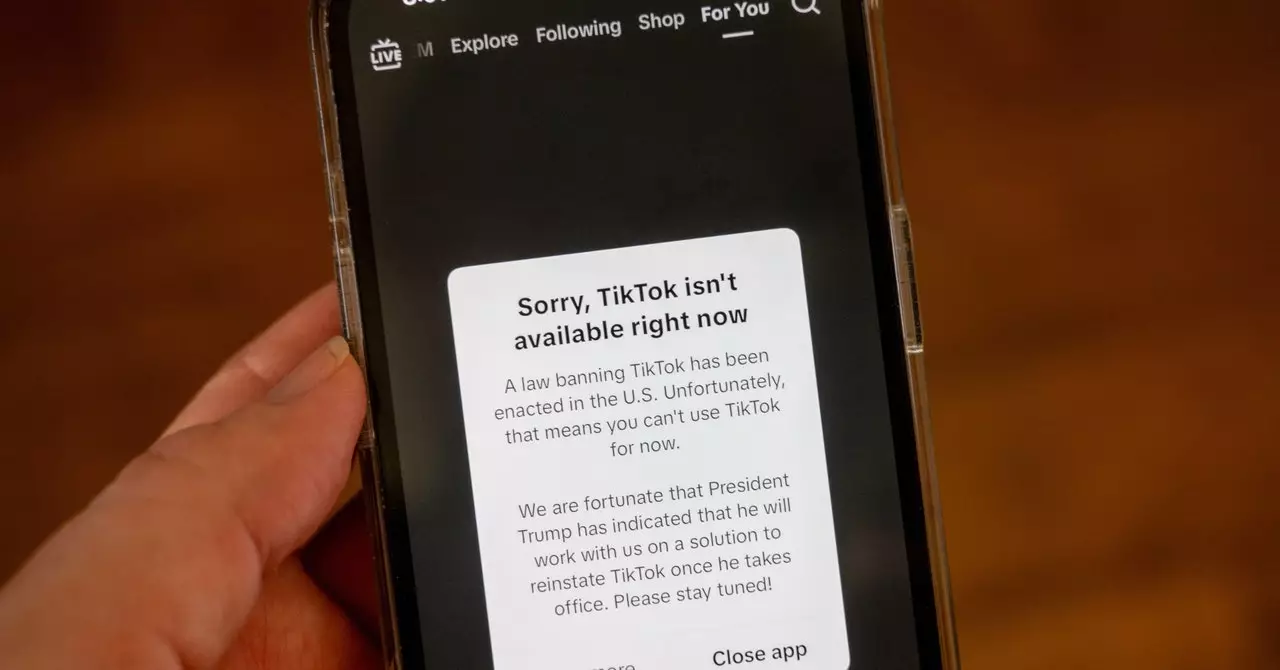The saga of TikTok in the United States exemplifies the complex interplay of technology, politics, and commerce. The platform has become embroiled in significant controversy, encompassing the concerns over data privacy, foreign influence, and regulatory scrutiny. The circumstances surrounding TikTok’s brief suspension and its subsequent revival sheds light on the delicate balance of power among service providers, government entities, and the platform itself.
The abrupt suspension of TikTok’s services serves as a reminder of the volatility inherent in digital platforms subject to political whims. On the brink of governmental enforcement of a potential ban, TikTok plunged into darkness—a move that highlighted the critical reliance on major tech companies like Apple and Google for its survival. With language that suggested urgency and a nod to the fears surrounding censorship, the company articulated its reliance on these service providers and hinted at a collaborative comeback.
President-elect Donald Trump’s intervention provides a pivotal lesson in the realm of governance, showing how executive authority can sway corporate actions. His declaration advocating for clarity concerning the potential penalties faced by service providers who offered TikTok demonstrated the ability of political narratives to shape business landscapes. However, this scenario raises questions about the broader implications of such influence—does it chart a course towards an era of corporate compliance with political machinations?
The intricate legal battles surrounding TikTok weave a narrative critical to understanding its uncertain future in the U.S. Legislative actions from Congress, urging ByteDance to extricate its American operations, underline a growing unease about foreign tech entities’ data practices. The resultant fallout has highlighted the tension not only between national security and global commerce but also between individual rights and government oversight.
Despite a decisive loss at the Supreme Court, TikTok’s legal arguments surrounding the First Amendment mark a broader struggle over digital free speech. The willingness to fight back and seek redress indicates a growing awareness among companies operating in this landscape about the need to defend their rights, while at the same time navigating the precarious circumstances dictated by policymakers.
Corporate Giants’ Role in the TikTok Dilemma
The retreat of major app stores from distributing TikTok offers a stark reminder of just how intertwined corporate interests and political agendas can be. The swift withdrawal by Apple and Google underscores the power these companies wield in determining the accessibility of digital platforms. Their actions herald a new era of corporate responsibility—or the lack thereof—especially when confronted with politically charged mandates.
The anticipation of Oracle shutting down servers that managed TikTok’s US data also raises pertinent concerns regarding the temporal nature of corporate partnerships in tech. As organizations bend to political will, the question arises: will this set a standard where tech firms prioritize compliance over the protection of digital services that serve millions? The partnership dance involves balancing profit, user experience, and governmental requests, which can often clash.
A Road Ahead: Balancing Safety, Ownership, and Ethics
The potential restructuring of TikTok’s ownership, as suggested by Trump’s conversations concerning a joint venture involving either him or figures like Elon Musk, indicates a shift toward a solution that seeks to placate national security concerns while ensuring the platform’s operational continuity. However, it simultaneously raises ethical dilemmas regarding the commodification of digital spaces and the degree to which financial ownership can alleviate fears of foreign influence.
As the TikTok saga continues to unfold, it reveals more than just a battle for a social media platform; it embodies broader themes of digital regulation, personal privacy, and the ever-evolving nature of content creation in a connected world. The future of TikTok in the U.S. remains uncertain, yet it serves as a critical case study into the vital roles of legislative engagement, corporate responsibility, and the prioritization of user rights within today’s digital ethos.
While TikTok’s immediate fate may have seen a reprieve, the paramount issues of data ethics, foreign influence, and corporate compliance remain at the forefront. Both leaders and regulatory bodies must tread carefully, lest the efforts to preserve an app morph into a struggle that jeopardizes the rights of users and integrity of democratic values themselves.

